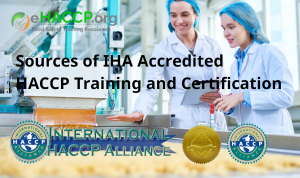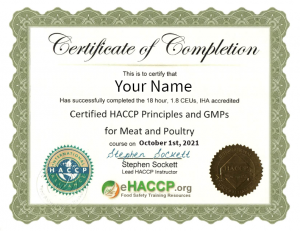Sources of IHA Accredited HACCP Training and Certification
Obtaining certification through an IHA-accredited HACCP training program signifies a commitment to maintaining high food safety standards.
Excellent course very detailed and user friendly. The course is set up so you can reference the materials as you go. Excellent content and I feel confident in writing our internal HACCP Plan.”
LUNENBURG, NS, CANADA, July 29, 2024 /EINPresswire.com/ -- Introduction To IHA Accredited HACCP Training Content and Instructors— Cheryle Harrell
The International HACCP Alliance (IHA) plays a pivotal role in ensuring food safety standards are met and maintained across the globe. Founded in 1994, the IHA collaborates with industry experts, academia, and regulatory agencies to promote Hazard Analysis Critical Control Point (HACCP) principles. An essential component of this initiative is the provision of IHA-accredited HACCP training programs designed to equip food industry professionals with the necessary knowledge and skills to implement and manage effective food safety systems.
Obtaining certification through an IHA-accredited HACCP training program not only enhances personal credentials but also signifies a commitment to maintaining high food safety standards within an organization. These programs cover critical aspects such as hazard analysis, identification of critical control points, establishment of preventive measures, monitoring procedures, corrective actions, verification processes, and record-keeping practices. The rigorous curriculum ensures that participants are well-versed in both theoretical concepts and practical applications.
Moreover, IHA-accredited training is recognized globally for its adherence to stringent educational standards. This recognition ensures that certified individuals are capable of contributing significantly to reducing risks associated with foodborne illnesses. As such, seeking out these accredited programs becomes imperative for those looking to excel in the field of food safety management.
Benefits of Obtaining HACCP Certification
Obtaining HACCP (Hazard Analysis Critical Control Point) certification offers numerous benefits that extend well beyond compliance with regulatory requirements. One of the foremost advantages is the enhanced safety and quality of food products, which can significantly reduce the risk of foodborne illnesses and contamination. This proactive approach not only protects consumers but also enhances a company's reputation for high standards in food safety.
Moreover, HACCP certification can lead to improved operational efficiency. By systematically identifying and managing potential hazards, businesses can streamline their processes, reduce waste, and minimize downtime caused by safety breaches or product recalls. This structured methodology fosters a culture of continuous improvement, where employees are more aware of safety protocols and quality controls.
In addition to operational gains, HACCP certification often opens doors to new market opportunities. Many retailers and suppliers require HACCP-certified partners as part of their procurement process. Thus, having this certification can expand a company's customer base and increase its competitive edge in both domestic and international markets.
Lastly, obtaining HACCP certification demonstrates a company’s commitment to adhering to industry best practices and regulatory standards. This commitment not only builds consumer trust but also provides a robust defense against legal actions stemming from food safety incidents.
Understanding the Requirements for IHA Accreditation
Understanding the requirements for IHA accreditation is crucial for those seeking HACCP training certification. The International HACCP Alliance (IHA) sets stringent standards to ensure that training programs provide comprehensive, accurate, and effective instruction on Hazard Analysis Critical Control Points (HACCP) principles. To gain IHA accreditation, a training program must cover all seven principles of HACCP thoroughly. This includes conducting a hazard analysis, identifying critical control points, establishing critical limits, implementing monitoring procedures, taking corrective actions when necessary, verifying that the system works effectively, and maintaining proper documentation.
Additionally, the course content must be developed by experienced professionals with substantial expertise in food safety and HACCP systems. The instructors themselves should possess significant credentials and practical experience in the field. Furthermore, IHA-accredited programs often include interactive components such as case studies or practical exercises to ensure participants can apply theoretical knowledge in real-world scenarios.
The curriculum must also align with current regulations and industry best practices. Regular updates to the course material are essential to reflect any changes in food safety laws or emerging risks within the industry. Understanding these requirements helps prospective trainees select programs that not only meet IHA standards but also equip them with the skills needed for successful HACCP implementation.
Top Training Providers for IHA Accredited HACCP Certification
When seeking IHA-accredited HACCP training for certification, it is essential to choose reputable providers known for their comprehensive programs and industry recognition. Among the top training providers, several institutions stand out due to their robust curriculum, experienced instructors, and strong track record of student success.
One notable provider of course providers is the International HACCP Alliance (IHA) itself. As the certifying body, the IHA offers a directory of courses and course providers that ensure alignment with its stringent standards. These courses are often delivered by seasoned professionals who bring real-world insights into food safety management.
Another distinguished provider is ehaccp.org, renowned for its interactive and engaging online training modules that cater to various learning styles. They offer a range of HACCP courses tailored to various food industries, ensuring that both beginners and seasoned professionals can benefit.
Additionally, SGS provides extensive HACCP training programs recognized globally. Their courses are designed by experts in food safety and cover critical aspects of hazard analysis and control measures through practical examples and case studies.
These providers exemplify excellence in delivering IHA-accredited HACCP training, making them ideal choices for individuals seeking certification to advance their careers in food safety management.
Online Options for HACCP Training
When it comes to obtaining HACCP (Hazard Analysis Critical Control Point) certification, finding the right training program is crucial for ensuring that food safety protocols are effectively implemented and maintained. One of the most convenient and flexible ways to achieve this certification is through online training options. These programs offer a range of benefits, from flexibility in scheduling to access to expert resources, making them an increasingly popular choice for both individuals and organizations.
Online HACCP training programs accredited by the International HACCP Alliance (IHA) provide comprehensive education on food safety principles, critical control points, hazard analysis, and risk management. These courses are designed to accommodate various learning styles and paces, allowing participants to study at their convenience without compromising on the quality of education received.
One significant advantage of online HACCP training is accessibility. Participants can enroll in these courses from anywhere in the world, eliminating geographical barriers that might otherwise limit access to high-quality training. This global reach means that even those in remote areas or with demanding schedules can obtain their certification without needing to travel or take time off work.
The structure of online courses often includes interactive modules that engage learners through multimedia content such as videos, quizzes, and simulations. This interactive approach not only makes learning more engaging but also helps reinforce key concepts through practical application scenarios. For instance, participants might be presented with case studies that mirror real-life situations they could encounter in a food production environment.
Moreover, many online HACCP training programs offer forums or discussion boards where learners can interact with instructors and peers. This collaborative element provides an additional layer of support and knowledge sharing which can be invaluable for understanding complex topics or clarifying doubts.
Another benefit is the ability to revisit course material as needed. Unlike traditional classroom settings where information may only be presented once, online platforms typically allow learners unlimited access to course content throughout their enrollment period. This means participants can review challenging sections multiple times until they fully grasp the material.
Quality assurance is another critical factor when considering online HACCP training options. IHA-accredited programs adhere to rigorous standards ensuring that the curriculum meets industry requirements for food safety management systems. By choosing an IHA-accredited course, participants can be confident they are receiving education that aligns with internationally recognized best practices.
Furthermore, many reputable online providers offer certification upon completion of their courses which is widely recognized by employers and regulatory bodies alike. This credential not only enhances professional credibility but also demonstrates a commitment to maintaining high standards in food safety practices.
In conclusion, online IHA-accredited HACCP training offers a flexible, accessible, and effective route towards achieving certification in food safety management systems. With comprehensive content delivered through interactive modules and supported by expert resources, these programs provide valuable tools for both personal development and organizational compliance within the global food industry.
In-Person Training Opportunities for HACCP Certification
In-person training opportunities for HACCP certification are invaluable for those seeking a comprehensive understanding of Hazard Analysis and Critical Control Points (HACCP) principles. These sessions, often facilitated by seasoned professionals, provide a hands-on learning environment that enhances the retention and application of critical food safety practices. Typically held in various locations nationwide, these training programs are designed to cater to different industries within the food sector, ensuring that participants receive relevant and specific guidance.
Participants benefit from direct interaction with instructors who bring real-world experience to the classroom. This setting allows for immediate feedback on queries and concerns, fostering a deeper comprehension of complex topics such as hazard analysis, establishing critical limits, and implementing effective monitoring procedures. Additionally, in-person training facilitates networking among peers from diverse backgrounds, which can be instrumental in sharing best practices and solutions to common challenges.
Furthermore, these sessions often include practical exercises such as mock inspections or case studies that simulate real-life scenarios. This experiential learning approach solidifies theoretical knowledge by applying it to tangible situations. Overall, in-person HACCP certification training equips attendees with the skills necessary to ensure food safety compliance effectively within their respective organizations.
Cost And Duration of IHA Accredited HACCP Training Programs
The cost and duration of IHA-accredited HACCP training programs can vary significantly depending on several factors, including the level of the course, the format (online or in-person), and the provider offering the training. Generally, these programs are designed to be comprehensive yet flexible to accommodate busy professionals in the food industry.
For entry-level II HACCP certification courses, participants can expect to invest anywhere from $199 to $1200. These courses typically span two days or 16 hours, covering essential principles and practical applications of hazard analysis and critical control points. Advanced courses or specialized training modules may range from $500 to $3,000 or more. These often extend over several days and delve deeper into specific industry sectors or advanced HACCP techniques.
Online courses offer a convenient alternative for those who need flexibility. They usually provide self-paced learning options that can be completed within a few weeks, depending on individual schedules and commitments. In contrast, in-person workshops might require attendees to set aside dedicated time over consecutive days but often include hands-on activities and direct interaction with instructors.
Ultimately, while costs can vary widely based on these variables, investing in an IHA-accredited HACCP training program is crucial for ensuring food safety compliance and enhancing professional expertise in the food industry.
Tips For Successfully Completing the Certification Process
Successfully navigating the certification process for IHA-accredited HACCP training requires a strategic approach. Begin by thoroughly understanding the course material, which forms the foundation of your knowledge. Regularly reviewing and engaging with the content ensures you internalize crucial concepts such as hazard analysis, critical control points, and preventive measures. Active participation during training sessions is key; ask questions and seek clarifications to deepen your comprehension.
Time management is another critical factor. Allocate specific times in your schedule dedicated solely to studying and reviewing course materials. Breaking down the curriculum into manageable sections can prevent feeling overwhelmed and enhance retention of information.
Utilizing available resources can also significantly impact your success. Many training programs offer supplementary materials such as practice exams, study guides, and interactive modules—make full use of these tools to reinforce learning.
Stephen Sockett
eHACCP.org
+19023437763 ext.
email us here
Visit us on social media:
Facebook
X
LinkedIn
YouTube
Other
Video overview of eHACCP.org. Online HACCP training and certification for food companies; producers, processors / manufacturers, meat and poultry, seafood, etc.


